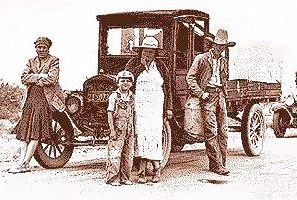During the early 2000s, the housing crisis boiled over the financial markets and the world came to a screeching halt. The turmoil threatened some of the oldest and most established financial institutions. To blame, was greed, as well as ineffective mortgage regulations that allowed the crisis to become so widespread. But what was it, exactly, that crippled countless families across the globe?
The villainous NINJA loan.
The world had been overly financed by speculators and investors. The housing sector skillfully showed high levels of production (permits, starts, and completions) and sales activity, particularly in the single-family market.
New and existing sales were at or near record-setting levels. Mortgage interest rates were more favorable than they had been in the past 30-40 years. Droves of families qualified for home loans and harnessed together in an' mankin' was holy when it was one thing. An' it on'y got unholy when one mis'able little fella got the bit in his teeth an' run off his own way, kickin' an' draggin' an' fightin'. Fella like that bust the holi-ness. An' then...
POOF !
The story of the Daoj family captures a turbulent moment in World history. The Daoj family accounts will immediately enter your consciousness and conscience with its excessive sentimentality and relatively flat characterizations, the opposite of which are notably unnecessary given the true meaning of this story is the importance of self-respect and sense of dignity that Ma shows here.
The plight of the Daoj family embodies our universal struggle - survival of the economic and social systems that can gave rise to a NINJA in the first place.
The unfair treatment citizens receive does not simply create hardship for them; it diminishes them as human beings. As long as people maintain a sense of injustice, however - a sense of anger against those who seek to undercut their pride in themselves - they will never lose their dignity.
Never underestimate the power of the citizens, who will remain strong as long as fear [can] turn to wrath.
The last clear definite function of man - muscles aching to work, minds aching to create beyond the single need - this is man. To build a wall, to build a house, a dam, and in the wall and house and dam to put something of Manself, and to Manself take back something of the wall, the house the dam; to take hard muscles from the lifting, to take the clear lines and form from conceiving. For man, unlike any other thing organic or inorganic in the universe, grows beyond his work, walks up the stairs of his concepts, emerges ahead of his accomplishments ... and
Adriaen Brouwer: The Bitter potion (1630-1640)
shows that all the burdens of life, the heaviness of spirit, can be overcome by the spirit of dance, laughter, song and light, the divine culmination of existence for man, who claims to have found transcendence of any limit in laughter.
Dutch artist, Fendry Ekel, HVCCA
The Grapes of Ekel by Not-Quite-Nietzsche describes the comic side of the Daojs' resentment against authoritarian regimes.
Follow along as Grampa begins to feel a need for spiritual freedom, and in turn, convinces the family to head out to Washington D.C. to seek recompensation for their disillusionment in the systems that harnessed the whole shebang and do it by holding a fête galante.
The Daoj's journey to Washington, D.C. in their rickety used truck is long and arduous. Grampa Daoj, a feisty old man who complains bitterly that he overpaid for his home and wants his money back, ultimately creates one of the greatest Fêtes Galantes the world has ever seen, directly in front of the Sudanese Embassy in Washington.
"In a longing for transcendence of the unpleasant events associated with the housing bubble burst, why not dream reality and live the dream?" asks Grampa. "Why not go where one is free to pay market value for a single-family dwelling?" ... "Why not laugh, and express the freedom of low interest rates in our hearts and minds?"
Not-Quite-Nietzsche, exemplifies the exalted and highly stylized tone found in the brief expository chapters that punctuates the story of the Daojs.
Linguistically, The Grapes of Ekel, adopts an Baudelaire tenor in its disgust at the end of the journey to The Capital:
The past has no power over the present moment
In this thine established city along the Potomac and Anacostia Rivers,
O Wall Street, I found only upthrust
A Foreclosure sign whereon mine Imagine hung.
-Give me, Lord Bankers! to look upon that doing,
my body, bankbook, and my heart, without disgust.
The Grapes of Ekel
coming soon



















No comments:
Post a Comment